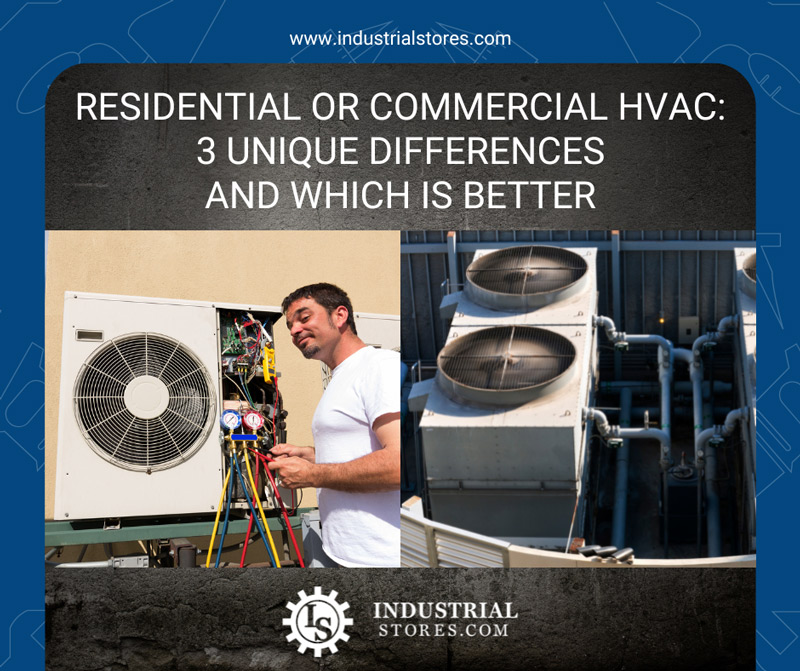Written by Industrial Stores Staff 02/08/23
When it comes to servicing residential or commercial HVAC units, the ultimate goal is the same: to ensure a comfortable indoor environment through sufficient cooling, heating, or ventilation.
This can only be done by a licensed HVAC technician, who repairs, installs, and maintains HVAC systems.
A career in the HVAC industry has a lot to offer. Some companies provide great benefits packages, including good health insurance, a 401k retirement program, and solid training opportunities.
However, there comes a time when every aspiring HVAC tech is torn between choosing a residential or commercial HVAC career.
Generally:
No HVAC technician is tied to one path; both careers are interchangeable and interlinked.
But knowing the key differences between the two will help you make a more informed decision about your career path.
Residential HVAC units tend to serve family homes and are located within or directly beside the house.
It’s also seasonal. Not many homeowners can go without a functioning heating system during winter or a cooling system during summer. So residential HVAC technicians have their peak seasons during these times.
But one of the most rewarding aspects of working as a residential HVAC technician is the one-on-one interaction you get with customers.
As you build a relationship with your clients, they’ll start calling you for the regular maintenance and repair of their HVAC systems.
Some will refer you to other homeowners, eventually increasing your customer base.
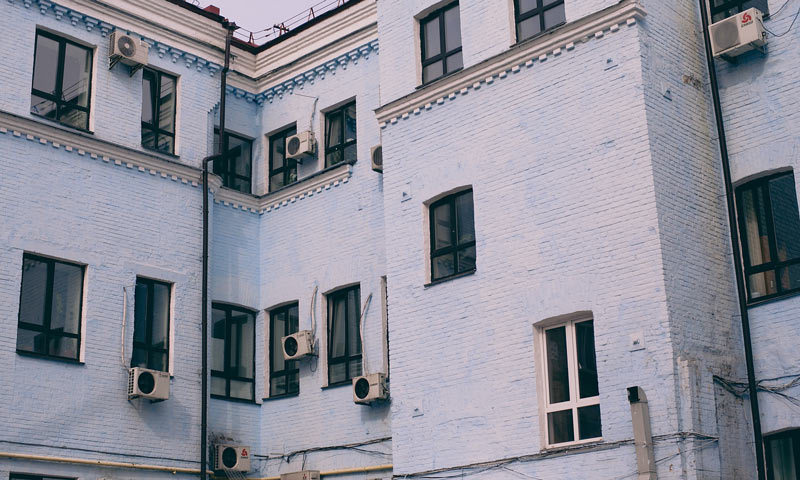
With commercial HVAC systems, this social aspect of the job is hardly experienced. Any contract is written and negotiated by the company you work for.
Once you get to the site, you will complete your task and leave. Even the invoice for the work is sent to your company’s billing department. This whole arrangement minimizes your interaction with clients.
However, unlike residential HVAC, commercial HVAC jobs have reliable working hours.
Commercial HVAC units are located in establishments and commercial buildings with typical 9 am to 5 pm working hours, Monday through Friday.
Commercial HVAC technicians will therefore have a similar work schedule and only deal with after-hour emergencies on rare occasions.
Most companies also have an organized work culture and assign shifts to different technicians, further leading to a more predictable schedule.
But a significant concern for commercial HVAC technicians is their unfavorable working conditions.
In many cases, commercial HVAC units are installed on the building’s flat roof. While the roof provides easy access for repairs and regular maintenance checks, technicians are exposed to harsh outdoor working environments.
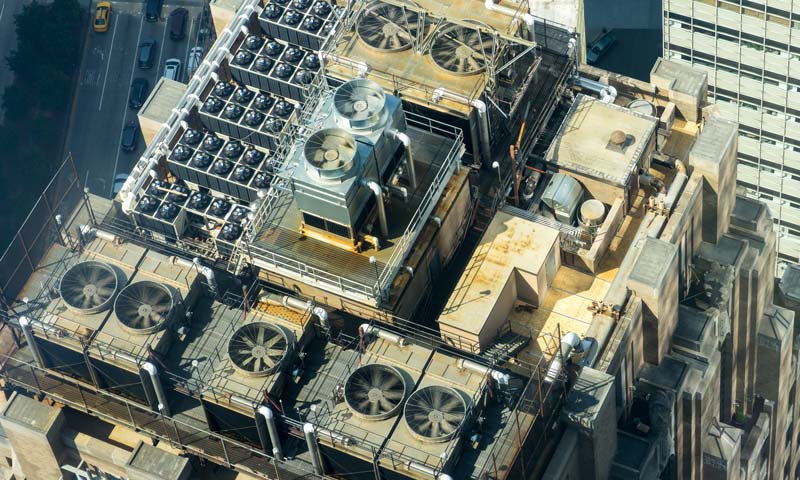
Continuous exposure to harsh elements like the scorching sun or the freezing cold can affect a technician’s health.
Commercial HVAC systems are huge and complex. To provide the necessary ventilation, they must have large compressors, fans, evaporators, blowers, and several thermostat settings.
Due to the complexity of the equipment they handle daily, commercial HVAC techs must go beyond the baseline education and training required to practice.
Each commercial HVAC unit installation is also custom; no two commercial properties will have the same HVAC needs, even if they’re the same size.
This requires commercial HVAC specialists to learn about the different approaches needed for every commercial HVAC installation and repair.
The complexity and diversity of commercial HVAC units, therefore, require specialized education and certifications around specific systems, with a dedication to keep learning.
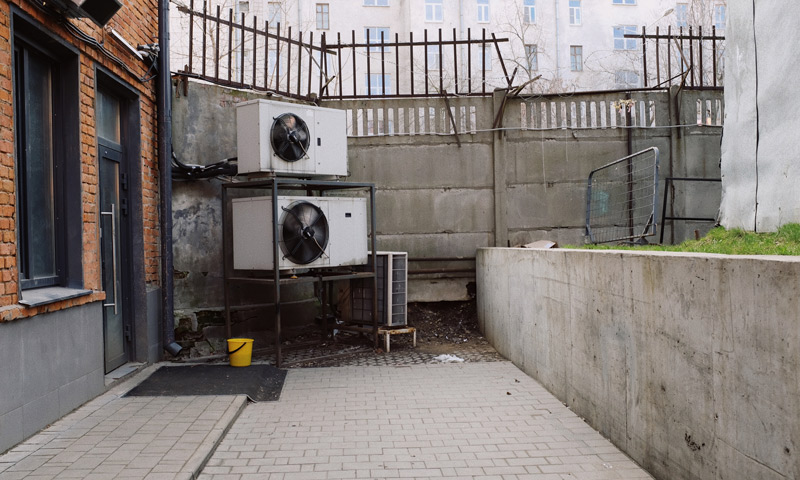
Residential HVAC units are easier to handle because they’re smaller in size and less complex.
It’s, therefore, possible to find a residential HVAC job with little qualification. What’s more critical is having great interpersonal skills since the job is more customer-oriented.
Oftentimes, technicians have to communicate directly with customers and negotiate services individually.
Knowing how to network with other professionals is an added advantage since this helps you connect to new clients. And if you create good connections with your customers, chances are they’ll want your services again.
Many aspiring HVAC techs start with residential work since it allows them to master the basic skills needed to succeed in the commercial sector.
By working as a residential HVAC tech, you gain experience in important but less taught areas like scheduling, customer service, and invoicing.
However, both residential and commercial HVAC technicians require soft skills like:
Related Article: How to Create Trust With Clients and Win HVAC Business
Commercial HVAC units are more complicated and intricate since they’re customized to meet a building’s specific requirements. Their installation relies on the building’s layout, size, and purpose.
Unlike residential homes, they’re massive in size, and some have designated rooms with specific cooling and heating needs.
This makes commercial HVAC jobs more complicated than residential ones. Professionals in this field encounter large and complex systems that vary significantly from one project to the next.
Due to the complexity of their tasks, commercial HVAC techs are often a part of a collaborative system. They work with architectural firms, contractors, and other stakeholders in the industry.
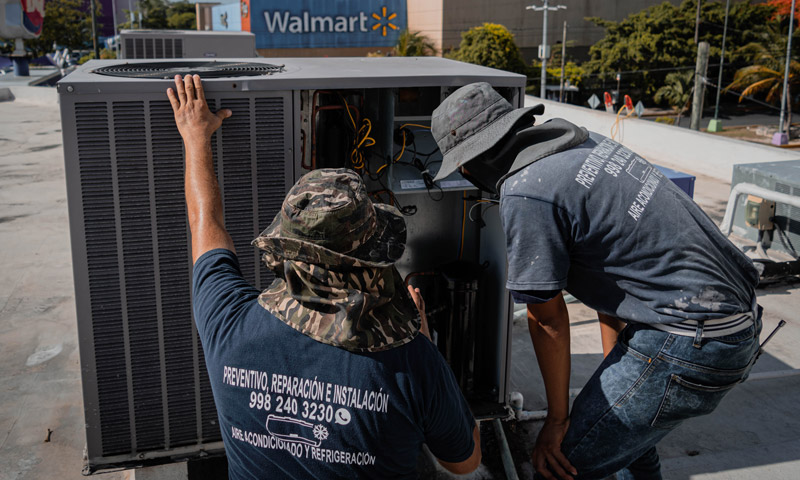
Residential HVAC technicians, on the other hand, handle residential HVAC systems, which are small and simple, and can be easily handled by one person.
This makes the job highly independent, with more direct interactions with customers. That’s why success in residential HVAC largely depends on interpersonal skills and customer relationships.
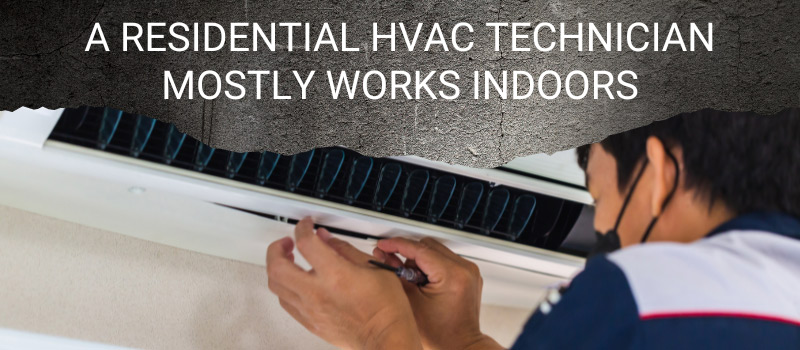
Both residential and commercial HVAC jobs provide valuable and in-demand services; neither one is inherently better than the other.
An interest in one field doesn’t prevent you from entering the other either. In fact, most technicians start with a residential HVAC job before proceeding to the commercial field.
But like any other career, it’s up to you to pursue opportunities that are most interesting to you.
Below is a table that summarizes the key differences between commercial and residential HVAC technicians to help you make an informed career choice.
Industrial Stores provides all the HVAC supplies and accessories every technician needs to repair or install an HVAC unit, all at affordable prices.
We offer thousands of quality products from reputable manufacturers that will stand the test of time, ensuring you get the most value for your money.
We also believe in establishing a great relationship with our customers. That’s why we offer personalized customer care, where you’ll get to speak with one of our professional customer service experts.
They’ll attend to all of your HVAC needs and ensure you experience fast and efficient shipping.
"... I ordered (6) RIBs on Tuesday, and they came on Wednesday! Unheard of without paying for overnight shipping! … Thank you …"
— Janet Wartschow
Visit our online store to place your order today. For further inquiries, call us toll-free at 1-866-494-4610, or visit the Contact Us page to reach a specific department.
Share on Facebook:
